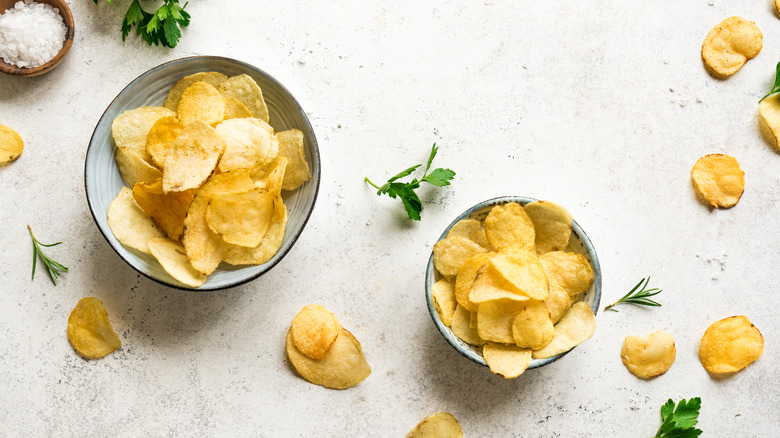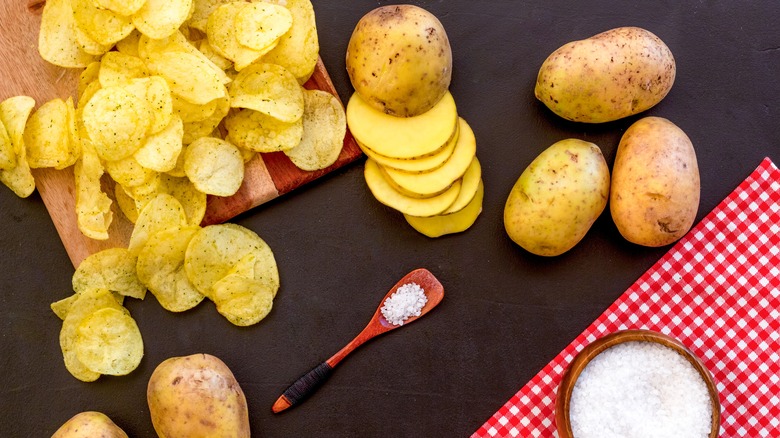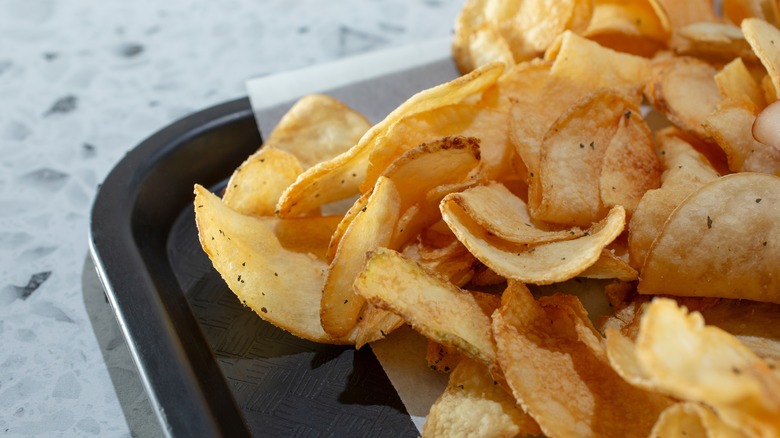The Microwave Method For Easy Homemade Potato Chips
Kettle cooked. Oven baked. Air fried. There are all kinds of ways to prepare crispy and crunchy potato chips, but did you know you can cook up the salty snack at home in the microwave? The method is a far cry from how the first potato chips were made in 1853 — fried in oil by George Crum, who worked as a cook in Saratoga Springs, New York, and inspired the snack's appearance on restaurant menus throughout New England and beyond. But while conventional frying might still be the status quo, it isn't always the most convenient way to make tasty potato chips. For that, turn not to the air fryer, the trendiest modern appliance for testing out creative cooking hacks, or even to the oven, but to the trusty microwave.
If you're wondering why you might bother to make potato chips yourself instead of snagging a bag off of supermarket shelves, there are plenty of reasons. Maybe you live in an ingredient household that's stocked with spuds but not any store-bought snacks. Or maybe you're looking for an alternative that's not as greasy or high in sodium. Turns out, making homemade potato chips at home is simple, so you can whip some up whenever you want to add an irresistible crunch to a tuna sandwich or even a PB&J. Besides the appliance itself, all you really need is a potato, a knife, parchment paper, and some oil. With a little know-how, it's easy to microwave your own potato chips.
The keys to successfully microwaving potato chips
Preparing a batch of homemade potato chips in the microwave is simple. Whether you're working with Yukon gold, russet, or even sweet potatoes, each tuber should be cut into thin slices, soaked, and evenly spaced out on parchment paper for best results. These simple steps ensure the chips end up evenly cooked without burning. Of course, you'll also want to season them before eating, whether you're in the mood for simple sea salt, a pinch of pepper, or splashes of vinegar.
Although the microwave might seem an odd choice for the task, as Chowhound's YouTube channel discovered, the appliance can work wonders on a potato. While other useful kitchen tools such as a mandoline, help speed up the process of making chips, a microwave's electromagnetic waves effectively heat water molecules, causing them to move rapidly and evaporate quickly. Since a potato is 80% water, only a few minutes of microwaving can turn a papery thin slice into a crunchy dehydrated chip. (Note that microwaved chips finish crisping up when cooling, so don't worry if the texture isn't perfect after cooking.)
Soaking the potato slices in cold water before heating them can help the process along by removing excess starch. Otherwise, the chips might brown too quickly or turn bitter. This crucial step may even make the snack healthier by limiting the formation of acrylamide, a potentially carcinogenic chemical created through the Maillard reaction, according to a study in the Swiss journal Foods.
Are microwaved potato chips worth making?
Microwaved potato chips may sound too good to be true. However, you'll probably find yourself pleasantly surprised. As it turns out, there are quite a few reasons to prepare potato chips with the humble appliance. Not only is it convenient — with the whole process taking only about half an hour, which could be less time than a trip to the store and back — but it allows for customization. By making the snack at home, you can still enjoy all your favorite flavors, from sour cream and onion to barbecue, but with full control over the ingredients. That's a big plus if you're looking for a less greasy alternative to conventional potato chips.
While there are other ways to cook potato chips, the microwave can certainly hold its own. In a Reddit post discussing this snack hack, one user wrote: "I tried baking versus frying in a pan versus microwaving, and the best results came from microwaving." Another person shared that they "did not think this would work but [the potato chips] were amazing."
The main downside to this method of making potato chips is that it's best for small servings. If you feel like munching on a bag's worth (or want enough for a week or two of snacking), you'll have to put multiple batches through the microwave, which could be rather time-consuming. Still, the taste of fresh homemade potato chips seasoned just to your liking may be worth the effort.


